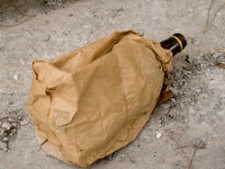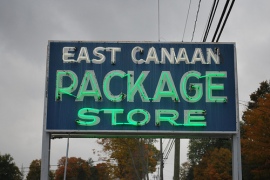Yesterday in the late afternoon, I went driving on Cape Cod. I followed back roads from village to village, passing glimpses of ocean inlets. A layer of hard snow covered the ground. The dusky silhouette of bare branches and pine boughs passed beside me. The temperature, which had reached only the low 20s, was falling into the teens. It was a thoroughly New England scene. Amid this familiar landscape, I found another very familiar detail: the package store.
Growing up in Connecticut, most towns had a “package store,” or a “packie,” as they were also called. It was only after college, when I moved to St. Louis, that I realized the “package store” is peculiar to southern New England. Apparently, the name stems from the requirement that alcohol be kept in a bag—and thus “packaged”—while one carries it home. This may be apocryphal, but I’ve never heard a more likely explanation. The packaging regulation is one example of the so-called “blue laws,” which also required that liquor stores close on Sunday. And the blue laws, in turn, are culturally descended from Puritan regulations of behavior and morality.
It is interesting to consider this far-flung connection between Puritan practices of the 1600s and a gaudy neon liquor sign. From Puritan to Packie: they are opposite ends of a long tapestry. We start with the dour Puritan and end at the corner beer shop; we achieve nearly a complete inversion of meaning.
- From Puritan: John Winthrop (1588-1649), leader of the Massachusetts Bay Colony. . .
- To Packie: Liquor store in Old Saybrook, Connecticut (2013).
The mandatory “packaging” of the booze is also interesting. One wonders whether a paper bag will change the moral character of six-pack of beer. We forget, today, the massive moral dimensions of the temperance and prohibition movements which bred these practices. The packaging regulation seems to suggest that the sight of liquor itself is a dangerous contagion. It is as if the evidence of impending frivolity constitutes a volatile public menace. At a practical level, the laws intend to corral drinking away from public spaces, on the grounds that one is less likely to consume alcohol that has been “put away” in a bag. Anyone who has ever passed a city alley knows this argument is weak:
In the end, I think the only real effect of a packaging law is in protecting the sensibilities of the teetotalers. A hidden vice is at least less obnoxious.
Package store regulations were just a small aspect of the blue laws. The laws’ larger impact, when I was a kid, was to close nearly all businesses on Sundays. Imagine: no shopping mall on Sunday. No Target! No Walmart!! These regulations arose from a cultural instinct to protect the Sabbath, again with clear antecedents in New England’s Puritan founding. Today it is hard to conceive of commerce coming respectfully to a pause for the sake of Sunday.
I remember reading, in college, about the 1961 Supreme Court case McGowan v. Maryland, which tested these laws against the separation of church and state. The Court ruled that the modern regulations had no explicit religious basis and upheld the blue laws, affirming that the state had a legitimate interest in promoting “a uniform day of rest for all citizens.” I liked this decision when I read it in 1991 and I like it even more now. A weekly day of peace from our noisy, aggressive economy would be healthful.
But of course the wind blows hard in the opposite direction. Package stores still close on Sunday, but the rest of the retail world runs full tilt. Blue laws are nearly gone. Connecticut and Massachusetts still close most shops on Thanksgiving and Christmas, and Maine and Rhode Island have some similar laws. Yet these last vestiges will surely soon be lost.
And so the hundreds of package stores must remain as a sort of historical marker, maybe even a bulwark. As a piece of New England vernacular, the “package store” holds fast against the constant homogenization of culture and language. The “packaging” of beer and booze survives as a faint echo from our temperance and Puritan forebears. Package stores still close on Sunday, hinting that there actually was a time when we refused to let commerce sprawl across every margin of our lives. And if nothing else, the package stores enrich the roadside. The beer is cheaper at Walmart and CVS, but it won’t taste very good if we lose all of this:





















Pingback: The Blizzard in Boston. | An Armchair Academic